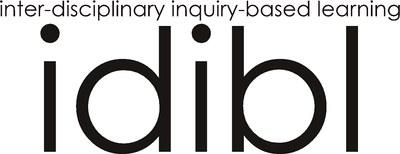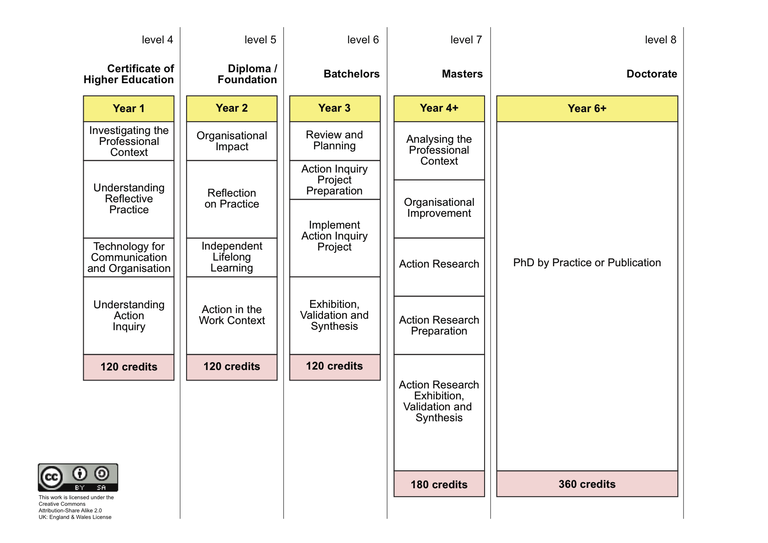[C20] Inter-Disciplinary Inquiry-Based Learning (IDIBL)
| When |
Aug 01, 2007
to
Jul 31, 2013 |
|---|---|
| Where | Bolton |
Aim: To design and develop a whole university framework for work focussed learning.

Reflection: Developing the IDIBL project meant taking a successful project, Ultraversity, and attempting to make it a whole university development – a huge challenge. Explaining the various aspects of this challenge meant exploring new theoretical perspectives and articulating the rationale for the model we designed for peer-review. This included learning about cybernetic theory, patchwork media, organisational analysis, change processes and disruptive innovation and analysing the findings of the project in this light. The approach was of participant action research and methods of survey, interview and interpretive phenomenological analysis were applied to the evaluation phases of the cyclical inquiry.
Contribution: My role was of co-developer, working closely to establish aims & values, design the curriculum, seek validation, organise, teach & mark work, operate quality mechanisms. I also designed the web site and fliers for marketing, sought meetings with stakeholders to market the course directly, worked with staff to disseminate ideas within the university, undertook research to establish evidence and co-wrote academic papers and made presentations at conferences. My part: 25% (with Stephen Powell and others)
Originality, impact and importance: The project was based on the experience of Ultraversity, but broke new ground by taking a whole university framework approach. It led to wholehearted adoption by some colleagues, whilst others appropriated parts of it for other courses. Its importance was in recognising the conditions under which work-focussed learning could prosper.
The rationale offered for validation of the framework in 2008
The inter-disciplinary inquiry-based learning framework (IDIBL) provides a pedagogic, organisational and assessment structure which can be used as a basis for course approval through modification of appropriate sections in this document by departments who identify an opportunity for an inquiry-based, work-focussed programme.
This should provide an agile procedure for introducing new courses, which intend using the innovative approaches developed for IDIBL. It remains for each course validation to identify a rationale for professional engagement, viability and delivery.
The framework is designed to offer a combination of pedagogical approaches, which together provide a different route for academic study and appeal to people who are committed to their. The course will widen participation by satisfying learners' whose need is for flexibility with time, place and pedagogy. More specifically this could be because:
- They need to continue in full-time paid employment whilst they study;
- They wish to make their study directly relevant to their work;
- Family commitments prevent their on-campus attendance;
- Geographical location or poor transport links makes campus attendance difficult;
- They seek to develop further their communicative creativity and technological understanding as a complete professional;
- Traditional examinations and academic essay writing are either intimidating or uninviting;
- They seek the company, support and intellectual challenge of fellow students rather than studying alone;
- They seek the advantage offered by technology to enjoy the possibility of work on joint ventures and studying collaboratively.
The modules contained within the framework focus on process, and generic concepts and outcomes rather than subject content. Through a process of negotiation between the individual learner and the course staff, a personalised inquiry will be developed to include learning activities and assessment products that meet the module requirements and informed by the learners’ professional practice. All learners in a cohort will be carrying out their inquiries and develop assessment products to the same set of milestones. Thus they are expected to provide support and challenge to each other and travel a common path in spite of the personalisation of their study. The design encourages different perspectives from diverse professional and academic disciplines to be exchanged.
Learners will align and defend their attainment against module learning outcomes and with reference to competencies or national standards relevant to their work context. Learners are expected to look critically at their work setting as a source of knowledge and experience from their own experience, colleagues’ experience and reference documents. This approach puts responsibility on the learner to maximise their effectiveness and efficiency through reflection on their work practice scaffolded by module requirements that are intentionally directed to enhance the quality and outcomes of work.
The framework is designed to enable progression by learners from a Foundation Certificate of CPD at level 3 through to level 7 Masters course. Common throughout the framework is an inquiry-led, work-based approach to learning that meets students’ progression and continuity needs throughout.
There is a growing realisation that practitioner knowledge can inform academic knowledge. This proposal recognises and supports a realignment of knowledge acquisition and sharing and a re-alignment of roles for staff in higher education and the practitioner in society.
As a backdrop, the 2006 Leitch report examines the UK's long-term skills needs and identifies increasing employer investment in higher level qualifications to meet the target of more than 40% of adults skilled to graduate level up from 29% in 2005. The approach outlined in this document is one route that should be attractive to employers and employees alike in that it offers a cost effective approach for students as they can gain their qualification at a full-time rate of study. It is attractive to employers as the focus of student study is directly related to improving their work performance.
Module framework

The development and outcomes of this work are more fully reported on the Work Focussed Learning web site.
(Words: 1009 )


